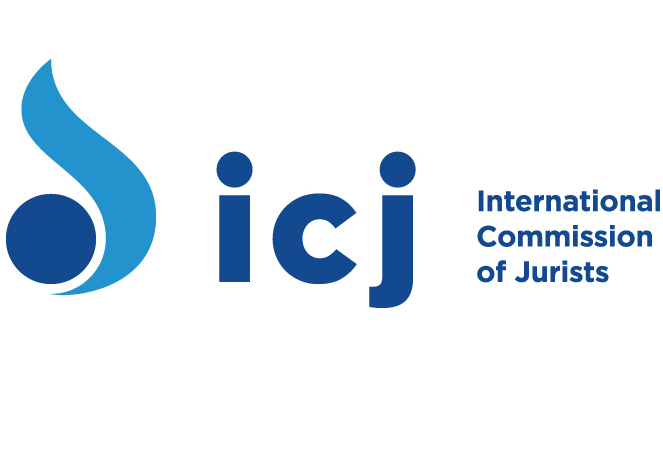
Jul 14, 2015 | Advocacy, Non-legal submissions
Today, the ICJ delivered an oral statement before the Human Rights Committee during a half a day of general discussion in view of the Committee’s ongoing elaboration of a new General Comment on Article 6 (Right to Life) of the International Covenant on Civil and Political Rights.
The ICJ’s oral statement focussed on the following:
- the principles of equality before the law, equal protection of the law and non-discrimination, as well as non-refoulment;
- State Parties’ duty to protect the right to life in respect of conduct of private actors;
- State Parties’ duty to take measures to protect and ensure the right to life in connection with acts of gender-based violence against women and violence against individuals based on their real or imputed sexual orientation and/or gender identity or expression;
- the relationship between the right to life and certain economic, social and cultural rights;
- the extraterritorial reach of the Covenant; and
- the application of Article 6 during situations of armed conflict.
Universal-ICJ oral statement HALF DAY GENERAL DISCUSSION ON GC-Advocacy-2015-ENG (full text in PDF)
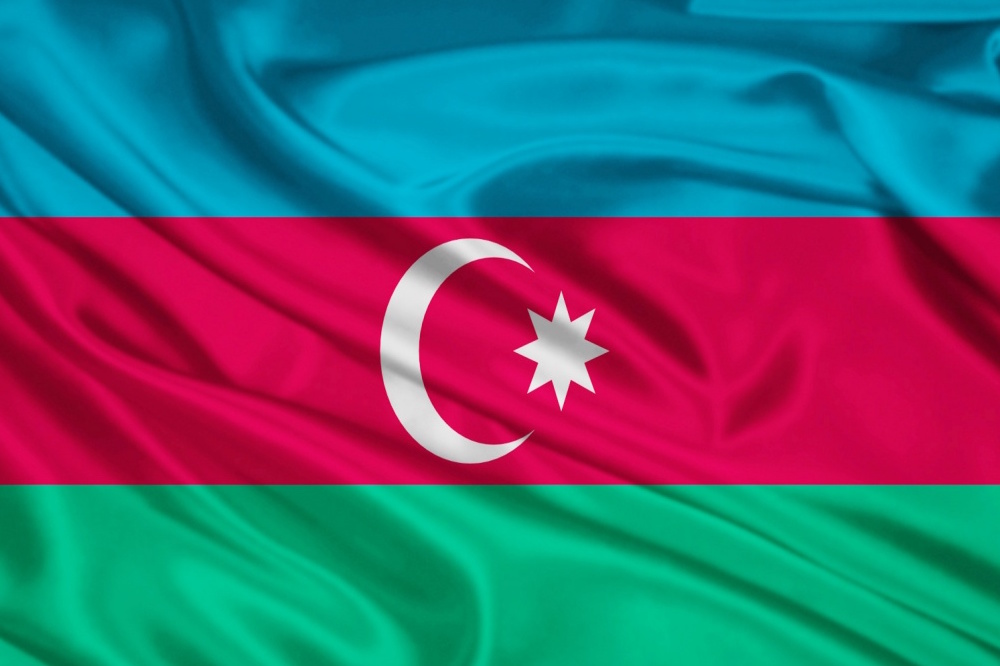
Jul 13, 2015 | News
The ICJ expresses concern at the recent decision of the Nizami District Court of Baku to disbar Khalid Baghirov, a prominent lawyer who litigates before national and international jurisdictions including the European Court of Human Rights.
Khalid Baghirov had been accused of the use of improper expressions and inappropriate behaviour, following statements he made in a hearing before Sheki Appeal Court, alleging that the judge in the case was biased.
On 2 February 2015, the ICJ observed the disciplinary hearing in the case of Khalid Baghirov before the Nizami District Court of Baku.
The Court’s decision, on 10 July 2015, follows the disbarment earlier this month of lawyer Alaif Ghasanov, for making a public statement about the conditions of detention of one of his clients, Leyla Yunus, a prominent human rights defender currently held in detention.
There are grounds to believe that Khalid Baghirov’s disbarment is in retaliation for his representation of clients in high profile cases, including prominent human rights defenders.
“Disbarments such as this have a chilling effect on the work of other lawyers, sending a signal that they may be penalized for discharging their functions independently and in accordance with international standards on the role and duties of the legal profession,” said Róisín Pillay, Director of the ICJ Europe Programme.
“Without independent legal representation, those who come before the courts cannot receive a fair trial and the system’s capacity to fairly administer justice under the rule of law is undermined,” she added.
Access to effective and independent legal assistance is an indispensable element of the right to a fair trial, guaranteed under the European Convention on Human Rights and the International Covenant on Civil and Political rights, to which Azerbaijan is a party.
The ICJ affirms that freedom of expression of lawyers constitutes an essential requirement for the proper functioning of the legal profession.
Article 23 of the UN Basic Principles on the Role of Lawyers states that lawyers: “[…] have the right to take part in public discussion of matters concerning the law, the administration of justice and the promotion and protection of human rights and to join or form local, national or international organizations and attend their meetings, without suffering professional restrictions by reason of their lawful action or their membership in a lawful organization.”
The European Court of Human Rights commented in its recent decision in Moris v France that where a lawyer makes statements regarding the functioning the judiciary, a matter of public interest, little room is left for restrictions on such comments which are protected pursuant to the right to freedom of expression.
In particular, the Court held that “[…] a lawyer should be able to draw the public’s attention to potential shortcomings in the justice system; the judiciary may benefit from constructive criticism”.
The ICJ calls on the public authorities of Azerbaijan as well as the Azerbaijan Collegium of Lawyers to ensure that lawyers, including those representing opposition leaders or human rights defenders, are not identified with their clients’ causes and are able to discharge their functions freely without any fear of persecution, harassment or improper interference.
Background:
Khalid Baghirov, an Azerbaijani lawyer, has represented a number of clients in high-profile cases, including Ilgar Mammadov, Leyla and Arif Yunus and Rasul Djafarov.
He has filed over 40 applications to the European Court of Human Rights, thirteen of which are pending communication.
On 17 March, 2014, Sheki Court convicted Ilgar Mammadov, leader of the “Republican Alternative” movement and former presidential candidate, and sentenced him to seven years of imprisonment.
The case was appealed to Sheki Appeal Court, and a hearing in the appeal was held on 12 August 2014.
On 25 September 2014, judge of Sheki Appeal Court Rashid Huseynov filed a complaint (1 (107)-90/2014) before the Collegium of Advocates requesting disciplinary measures against Khalid Baghirov for a breach of the Law of the Republic of Azerbaijan “On Advocates and Advocates’ Activity”, which included a failure to wear “lawyers’ outfit” in the court room, and use of improper expressions and behaviour incompatible with standards of lawyer’s conduct.
According to the complaint, on 12 August 2014, at the appeal hearing of Mammadov’s case by the Sheki Appeal Court, Khalid Baghivov was alleged to have said: “… like a state, like a court… If there were justice in Azerbaijan, neither the judge Rashid Huseynov would make unjust and biased decision, nor the person like him would be a judge”. He allegedly did not wear a lawyer’s gown during the appeal herrings on 12 and 13 August as well as on 3 and 4 September 2014 hearings.
On 19 November 2014, the Disciplinary Commission of the Advocates’ Collegium issued an opinion, finding that the applicant’s speech aimed to defame the State and was in breach of lawyer’s ethical standards.
On 10 December 2014, the Presidium of the Collegium of Lawyers suspended Khalid Baghirov’s practice, stating inter alia as follows: “The fact that advocate Khalid Baghirov stated the expression ‘like a state, like a court’ in the open court session casts a shadow not only on judiciary branch of Azerbaijan, more importantly, on our state that is considered to be holy for each citizen of Azerbaijan. […] Moreover, by using expression ‘If there were justice in Azerbaijan, neither the judge Rashid Huseynov would make unjust and preconceived decision, nor the person like him would be a judge’ Khalid Baghirov humiliated authority of the whole Justice System of Azerbaijan”.
At the same time, the Presidium applied to the Nizami District Court seeking complete termination of his right to practice law.
Contact:
Róisín Pillay, Director, Europe Programme, roisin.pillay(a)icj.org
Temur Shakirov, Legal Adviser, Europe Programme, temur.shakirov(a)icj.org
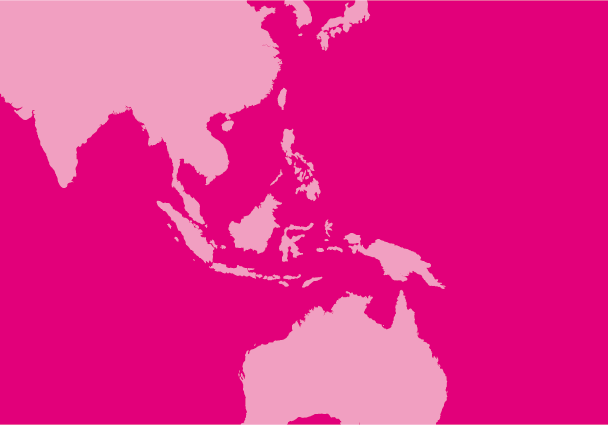
Jul 13, 2015 | News
The ICJ today condemned the approval by the Cambodian Peoples’ Party (CPP) of a law which aims to pose obstacles to and restrictions on the activities of non-governmental organizations (NGOs) in order to be officially registered in the country.
In June and July 2015, the ICJ and other international human rights groups sent joint letters to the Government of Cambodia, including to Prime Minister Hun Sen and the President of the National Assembly, urging for the withdrawal of the draft law.
“It is extremely disappointing that the Government has chosen to ignore widespread national and international criticism of the draft LANGO and calls for it to be withdrawn,” said Kingsley Abbott, International Legal Adviser for the ICJ.
“There is no doubt that the draft law’s restrictions on freedom of association and expression, in contravention of international law and standards, will severely impair civil society’s ability to carry out its vital work,” he added.
Today, the Cambodian National Assembly unanimously approved the draft Law on Associations and Non-Governmental Organizations (draft LANGO) promoted by the Cambodian Peoples Party (CPP) after 55 members of the opposition party, Cambodia National Rescue Party, decided to boycott the vote.
All 68 members of the CPP, including Prime Minister Hun Sen, attended the plenary session of the National Assembly and voted in favor of the draft law.
The draft LANGO will still have to be adopted by the Senate, and thereafter, receive the assent of the Cambodian King before it becomes law.
The ICJ calls on the Senate to reject the draft LANGO.
“The fact that the legislation was passed without genuine consultation with civil society tends to suggest that the Government’s intention is to weaken the impact of NGOs, including human rights defenders,” Abbott said.
The draft law’s most problematic provisions include:
- excessive documentation required for the registration of both domestic and international associations and NGOs;
- arbitrary powers of the Ministry of Interior and Ministry of Foreign Affairs to deny or revoke registration on the grounds of “public security, stability and order, or generate a threat to national security, national unity or the culture, traditions and customs of Cambodian national society”;
- the requirement that associations “adhere to a stance of neutrality vis à vis political parties”, and provisions that allow for the suspension and dissolution of groups that violate this requirement;
- the requirement that NGOs report to several ministries and to submit an annual report summing up work activities and finances; and
- the inclusion of sweeping provisions for the suspension and dissolution of domestic and international associations and NGOs.
Background
The draft LANGO, if ultimately adopted and implemented, would bring Cambodia into non-compliance with international law and standards.
As a party to the International Covenant on Civil and Political Rights (ICCPR), Cambodia must guarantee the rights to freedom of expression and association and ensure that no restrictions are put in place except under the strict conditions set out in articles 19(3) and 22(2) of the ICCPR. These conditions clearly have not been met under the terms of the draft LANGO.
In addition, Article 2 of the UN Declaration on Human Rights Defenders provides that each “State has a prime responsibility and duty to protect, promote and implement all human rights and fundamental freedoms, inter alia, by adopting such steps as may be necessary to create all conditions necessary in the social, economic, political and other fields, as well as the legal guarantees required to ensure that all persons under its jurisdiction, individually and in association with others, are able to enjoy all those rights and freedoms in practice.
Article 8 states that everyone “has the right, individually and in association with others, to have effective access…to participation in the government of his or her country and in the conduct of public affairs…[including] the right, to submit to governmental bodies and agencies and organizations concerned with public affairs criticism and proposals for improving their functioning and to draw attention to any aspect of their work that may hinder or impede the promotion, protection and realization of human rights and fundamental freedoms.”
Contact:
Kingsley Abbott, ICJ’s International Legal Adviser, t: +668 4092 3575 ; e: kingsley.abbott(a)icj.org
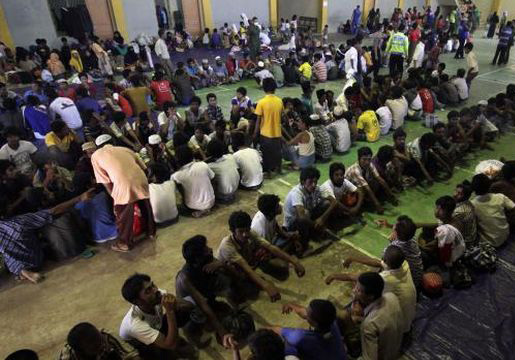
Jul 9, 2015 | News
In a letter sent today, the ICJ and seven other human rights organizations urge the Thai Government to drop criminal charges against two journalists from the online news outlet Phuketwan who are about to go on trial for writing about the trafficking of the Rohingya.
The letter was sent to the General Prayuth Chan-ocha, Prime Minister of Thailand.
The trial, which is set to start on 14 July, revolves around criminal charges brought by the Royal Thai Navy against Alan Morison and Chutima Sidasathian for reproducing one paragraph from a Pulitzer Prize-winning article written by Reuters news agency implicating the Navy in the smuggling of the Rohingya off the coast of Thailand.
“Thailand must drop these charges immediately and unconditionally,” said Sam Zarifi, ICJ’s Regional Director for Asia and the Pacific.
“Criminal prosecution of speech is a violation of international law, and the Thai Navy’s relentless pursuit of this case seems even more misguided as it comes at a time when journalists have played a vital role in uncovering mass graves on the Thailand-Malaysia border and thousands of migrants and refugees, including Rohingya, left stranded on boats in the Andaman Sea,” he added.
On 16 December 2013, the Royal Thai Navy lodged complaints of criminal defamation and offences against Thailand’s Computer Crimes Act (CCA) against the journalists.
On 17 April 2014, the journalists were charged with criminal defamation under articles 326 and 328 of the Thai Criminal Code, which carry a maximum penalty of two years imprisonment and a fine of up to 200,000 Baht (USD $6,000); and violation of article 14(1) of the CCA, which carries a maximum penalty of five years imprisonment and a fine of up to 100,000 Baht (USD $3,000).
“The absurdity of these prosecutions was emphasized when the Office of Thailand’s Prime Minister recently asked one of the two journalists, Chutima Sidasathian, who is working towards a Ph.D. on the Rohingya, to suggest a solution to the ‘boat people’ crisis,” Zarifi further said.
“It is not too late to follow that request with an unconditional withdrawal of all charges as an official recognition of the important work by Alan Morison and Chutima Sidasathian in raising these issues and as a concrete gesture of Thailand’s purported commitment to addressing them,” he added.
Contact:
Sam Zarifi, ICJ Asia Pacific Regional Director (Bangkok), t: +66 807819002; e: sam.zarifi(a)icj.org
Background:
Article 19 of the International Covenant on Civil and Political Rights (ICCPR), to which Thailand is a State Party, guarantees the right to freedom of expression, which includes the right to impart information. The UN Human Rights Committee, which monitors State compliance with the ICCPR, has expressed its concern at the misuse of defamation laws to criminalize freedom of expression and has said that such laws should never be used when expression is made without malice and in the public interest.
The ICJ, an increasing number of governments, the Human Rights Committee and other international authorities, believe that criminal defamation laws should be abolished. Such laws are inherently incompatible with the ICCPR and other international laws and standards on freedom of expression. Criminal penalties are always a disproportionate means to protect against reputational harm and pose an impermissibly severe impediment to the exercise of free expression.
Thailand was criticized in May 2014 when the United Nations Committee Against Torture expressed its concern “at the numerous and consistent allegations of serious acts of reprisals and threats against human rights defenders, journalists, community leaders and their relatives, including verbal and physical attacks, enforced disappearances and extrajudicial killings, as well as by the lack of information provided on any investigations into such allegations.”
The Committee recommended that Thailand “should take all the necessary measures to: (a) put an immediate halt to harassment and attacks against human rights defenders, journalists and community leaders; and (b) systematically investigate all reported instances of intimidation, harassment and attacks with a view to prosecuting and punishing perpetrators, and guarantee effective remedies to victims and their families.”
Thailand-Letter to PM Prayuth re Phuket Wan-Advocacy-open letters-2015-ENG (full text of the letter, in PDF)
Thailand-Phuketwan cases-News-Press release-2015-THA (full text of press release in PDF, Thai)
Thailand-Letter to PM Prayuth re Phuket Wan-Advocacy-open letters-2015-THA (full text of the letter, in PDF, Thai)
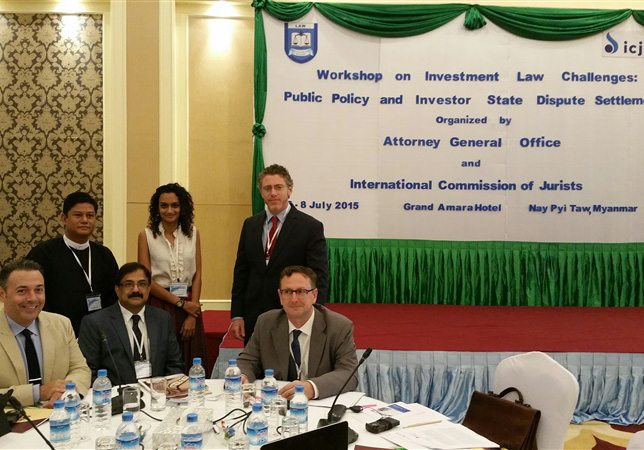
Jul 8, 2015 | News
The ICJ held a successful workshop with the Office of the Attorney General (OAG) on ‘Investment Law Challenges: Defending Public Policy in Investor State Arbitration’.
The event took place in Nay Pyi Taw from 6 to 8 July 2015 and was attended by 60 participants from the OAG and other Ministries.
The workshop was designed to raise awareness about Myanmar’s human rights obligations in relation to investment and to build the OAG’s capacity to draft law that carves out regulatory space for public policy making.
The workshop also prepared the OAG for challenges to public policy through arbitration with a moot court exercise.
The topic is timely as Myanmar rushes to draft new investment law and sign Bilateral Investment Treaties that give investors standing to challenge public policy promoting and protecting human rights.
In opening the workshop, Director General U Kyaw San spoke of the rapid increase of investment in Myanmar and the corresponding changes in its regulatory system.
Dr. Na Chi Oo, a speaker for the OAG, outlined the challenges this poses to the drafting of new public policy.
Participants heard from ICJ Commissioner Prof Andrew Clapham who discussed globalization, investment arbitration and public policy.
He examined the use of human rights law in investment arbitrations.
Guest speaker Prof. Anthony Daimsis introduced bilateral investment treaties and highlighted provisions that can restrict state regulatory space.
Prof. Errol Mendes gave examples of international cases in which public policy has been challenged.
Ms. Harpreet Kaur Dhillon, from the Centre for International Law, National University of Singapore gave practical advice for drafting law that protects the regulatory role of the state.
Dr. Daniel Aguirre, ICJ Legal Adviser, added that “Myanmar needs to update its regulatory system to protect the environment and human rights. It must make sure it does not sign away its regulatory role through investment law and bilateral treaties.”
The event culminated with a moot arbitration exercise where OAG participants engaged in a mock consultation process and a simulated arbitration over a public health policy.
The ICJ was impressed by the interest and genuine commitment of the participants to promote the rule of law and public policy in Myanmar.
The ICJ staff enjoyed open and frank discussion with the Attorney General and is Director Generals on relevant legal developments and looks forward to further discourse.
The ICJ remains committed to provide support in this field in line with the promotion and protection of human rights.









